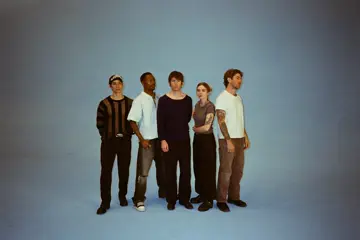How to succinctly describe director Iain Sinclair’s A View From the Bridge?
Alfieri (David Lynch) is our narrator and lawyer. Both inside and outside of the action, he introduces us to 1950s Red Hook, an Italian American working-class neighbourhood in Brooklyn. Eddie Carbone (Anthony Gooley) is a hard-working longshoreman, a labourer on the docks. It is clear that he loves his wife, Beatrice (Janine Watson) and his niece, Catherine (Zoe Terakes). He and Beatrice have raised Catherine as their own, after she was orphaned young. Generous of heart and with an old school, unionist solidarity, Eddie accepts two illegal Italian immigrants, Beatrice’s cousins, into their home. Marco (David Soncin) and Rodolpho (Scott Lee) arrive, inflamed with the passion of the American Dream, opportunities at their fingertips.
A View From The Bridge’s reputation precedes it. Playwright Arthur Miller is a name that automatically qualifies among the heavyweights of theatre in the 20th century. This production at Ensemble Theatre manages to counterbalance this weightiness. Two years ago, Sinclair directed this production at The Old Fitz. It was stripped back – a single prop, an empty stage, seven actors pulsating with ferocious life. It ran at Glen Street Theatre in the Northern Beaches on a major proscenium arch. It moved to MTC with a high tech run. It now appears in its fourth venue in two years, its fourth manifestation. Seeing it again stripped back, wooden floorboards as the stage, super minimalist tech, a single chair as set, a single prop, it remains a phenomenal piece of theatre.
This style of theatre requires so much of the actors. So much pathos and close character work, within each character and between them. Lee’s Rodolpho sets the stage alight with platinum blonde hair, humour and song. He and Terakes have bright futures ahead of them. Beatrice is as difficult a character as they come, dealing with the tensions of the house and an ever more distant marriage against a backdrop of economic uncertainty. Watson’s portrayal painfully carves out a woman refusing to mourn for what she sees vanishing in front of her eyes. Gooley is a leading man that Miller would be thrilled to see speak his words. While fatherly protectiveness takes on a rancid rancour, we cannot solely look down on him – there is too much to him for that. Gooley gives Eddie’s paradox a face and fists that the audience will not forget soon. The standout, though, must be Soncin’s performance as Marco. It is singular in its strength. Marco has children and a wife back in Italy. In every step, he bears their weight. In each thank you to his hosts, his gratitude is raw and unkempt. When there is a question of what is right, his actions are strong - both passionate and considered.
It is a privilege for Sinclair to work with Miller’s text in so many manifestations, and it must be a fine privilege to direct such actors in the work.
Don't miss a beat with our FREE daily newsletter















